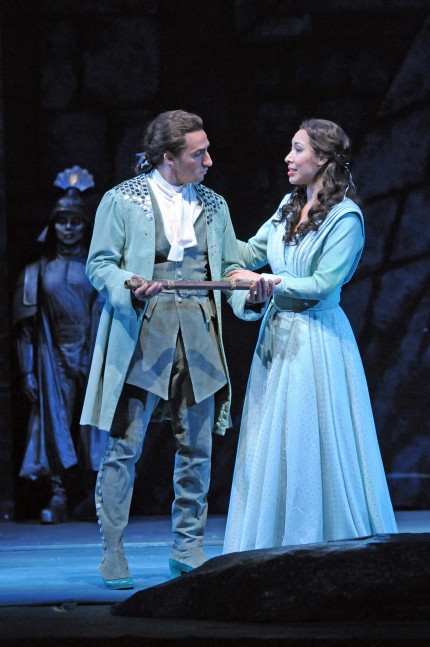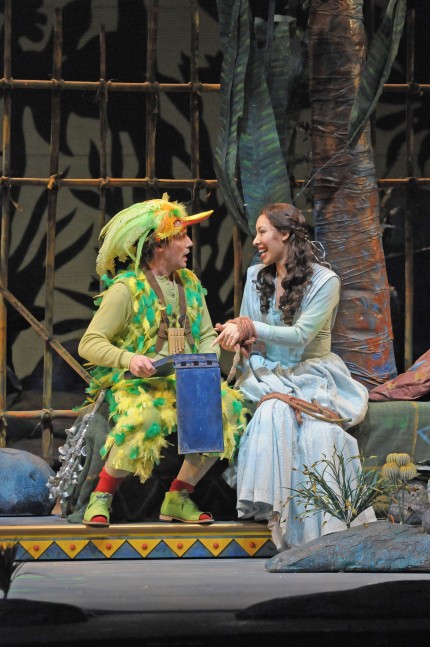Cabell and two outstanding Chicago debuts spark an irresistible “Magic Flute” at Lyric Opera

Charles Castronovo as Tamino and Nicole Cabell as Pamina in the Lyric Opera production of Mozart's "The Magic Flute." Photo: Dan Rest
If the holiday blues are discernible on the horizon, there can be no better antidote for the coming bleak midwinter than the Lyric Opera of Chicago’s delightful revival of its celebrated production of Mozart’s The Magic Flute, which opened Tuesday night.
Historically, the Lyric has not taken the road most easily traversed by simply relying on the beloved August Everding-Jörg Zimmermann staging to sell its Zauberflöte. So too, in this 25th anniversary season of the production’s premiere, Lyric has once again corralled a terrific lineup of singers with all but one of the principals making their company debuts.
Nicole Cabell is the one known quantity in this cast. The popular singer’s lyric instrument is eminently well suited to Mozart’s heroine and in her first local appearance as Pamina, Cabell proved what a really superb Mozartean she has become. Rich and exquisite in tone, Cabell’s is one of the most beautiful soprano voices of our time, and she sang with extraordinary gleam, expressive nuance and faultless technique throughout.
If in the early going her Pamina seemed more coquettish than innocent, Cabell’s portrayal grew in dramatic depth as the evening unfolded. She rose to the considerable challenge of Ach, ich fühl’s superbly, singing with a seamless legato and bringing a stark, affecting despair to Pamina’s pain when she thinks Tamino has abandoned her. Cabell was also alive to the opera’s comedy and brought an ennobled radiant presence to the final scene.
As Tamino, the prince who instantly falls in love with a portrait of the captured Pamina, Charles Castronovo made a most impressive Chicago debut. The New York native has an imposing voice, his ample tenor tempered with the necessary elegance for this role. Castronovo’s Dies Bildnis was rendered with ardent tone and he blended winningly with Cabell in their duetted moments. Castronovo also made a worthy hero, poised and confident on stage with a dramatic understatement that nicely complemented Cabell’s charismatic heroine.

Stephane Degout as Papageno and Nicole Cabell (Pamina) in "The Magic Flute." Photo: Dan Rest
It’s a testament to the artistry of Cabell and Castronovo that they managed to hold their own against Stephane Degout’s knockout Lyric debut as Papageno. The French baritone possesses a robust voice, easily able to handle the demands of the score. In a signature role, Degout delivered a larger-then-life performance as the earthy bird-catcher — genuinely funny without ever going over the top, and handling the staging’s daunting demands with physical grace and unflagging energy. As with Castronovo, this is a singer we need to have back soon.
Audrey Luna, also making her house debut, proved the evening’s wild card as the Queen of the Night. She got off to a less-than-stellar start with a cautious, thin-toned O zittre nicht, tiptoe-ing her way through the high-flying second part. The soprano managed to come back strong after intermission, tackling the stratospheric fireworks of Der Hölle Rache with greater assurance and the requisite coloratura bravura.
Günther Groissböck brought apt fatherly dignity and vocal gravitas to Sarastro. The Austrian bass’s voice is not large but possesses the dark eloquence for the role and Groissböck descended to the subterranean low notes with ease.
Rodell Rosel brought a febrile tenor and wonderful evil relish to the villain Monostatos. Jennifer Jakob was a charming Papagena, and it was great to see the veteran baritone Richard Stilwell back to invest the Speaker with such natural authority.
Elizabeth Meister, Cecilia Hall and Katherine Lerner made up a somewhat uneven trio of Ladies, while the Three “Boys” (Anna Stephan, Benjamin Hoppe and Nicole Horio) proved a much better-sung group of youthful guides than usual.
It’s a rare Magic Flute that has one checking the program to find out who sang the two Armed Men, but Ryan Center members Bernard Holcomb and David Govertsen brought a striking vocal quality to these small roles. James Kryshak, Paul Scholten, William Combs and Jeffrey Taylor made up a worthy group of Priests.
For a company where stagecraft has been a sometime thing in recent seasons, this Magic Flute is a salutary reminder — as is the Lyric’s equally dazzling Ariadne auf Naxos — that a visually appealing production is an essential part of the show. True, Zimmermann’s imaginative storybook scenic designs are looking a bit worn in places, but in its umpteenth local revival since its 1986 bow, the production still worked its considerable practical magic Tuesday night. Even the most hardened cynic will find it impossible to resist the cavorting animals, the Three Boys’ flying ship, Monostatos’s henchmen breaking into dance or the countless clever touches in the penultimate scene with Papageno and Papagena (even if the local nod to Chicago sports teams seemed like a bit of lily-gilding).
Having Papageno untie the bound Pamina during Bei Männern was a bit of distracting stage business that undermined one of Mozart’s most sublime duets. Otherwise, Matthew Lata’s fluent direction again skillfully handled the myriad practical challenges and split-second timing required in this complex, fast-moving production.
Sir Andrew Davis’s Mozartian bona fides were manifest throughout in musical direction that gracefully blended scintillating energy and lyrical warmth.
Mozart’s glorious score is one of the wonders of the ages and his child-friendly — but never shallow — Masonic fantasy remains irresistible for young and old alike, especially with this cast and production. Tickets are already getting scarce but this is not a show to miss.
The Magic Flute will be repeated Dec. 8 and 10 and Jan. 4-22. Alek Shrader will sing the role of Tamino Jan. 9-22. lyricopera.org; 312-332-2244.